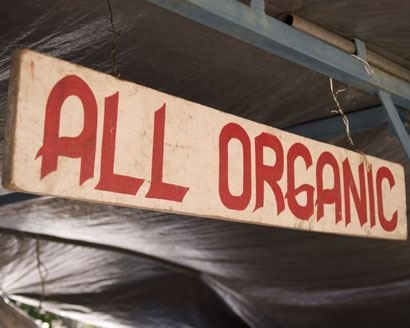Are 'Organic' Foods Worthless? Not On Your Life!
Stanford University just published a study saying that the literature "lacks strong evidence" that organic foods are more nutritious than their conventional counterparts. Some of you are probably kicking yourself for trading your child for that precious locally grown, organic tomato you bought last week at Whole Paycheck, while conventional farmers are doing the "Told-You-So" dance.
Is there still a reason to eat organic despite the study? Yes, there is — and it has everything to do with health, the scientists at Stanford notwithstanding. Despite the headlines across major newspapers, organic food is better for you. And here's why:
1. PESTICIDES According to the study, the researchers found that 38% of the non-organic food studied had pesticide residues. This is in comparison to 7% found in organic produce. The researchers basically pooh-poohed the effects of pesticides because even the higher levels were below what is considered accepted by Environmental Protection Agency. But what the researchers didn't address was the potential long-term effects of pesticides.
Their longest study spanned only two years. Most cancers and other diseases associated with pesticide exposure take much longer than that to manifest. And if you have kids, you should be especially worried, because pesticides affect children more adversely than adults due to their lower body weight, so even exposure that is under EPA levels for adults could be threatening for children. Pesticides, too, cause a chain reaction across ecosytems by poisoning the entire food chain. And in learning how to resist pesticides, ironically, pests get heartier. In a farmers' version of the nuclear arms race, heavy use of pesticides encourage pesticide resistance in organisms, which in turn only encourages heavier use of pesticides in another form.
2. ANTIBIOTICS While the researchers did acknowledge exposure to the antibiotics that lace non-organic meats and poultry as a reason for going organic, what they did not explain was the effects that the antibiotic-laced meat sold in most grocery stores can have on antibiotic-resistant bacteria. Currently, 80% of all antibiotics used in the US are for livestock use. And most of those antibiotics aren't curing Elsie the cow of her nasty flu: They are used to promote growth or yield (e.g. milk or meat output). This rampant use of antibiotics in farms and ranches has only increased the amount of antibiotic-resistant bacteria that can potentially infect us all.
According to the US Food and Drug Administration's own reports, common meats, such as chicken breast, ground turkey, ground beef, and pork chops have had increases of 26.6%, 55.3%, 11.5% and 17.5%, respectively, in E. coli that is resistant to three antibioitic classes. And that's just E. coli; wait till you see the numbers for Salmonella. Until the FDA gets their act together about banning or severely curtailing sub-therapeutic use of antibiotics, the only insurance we have against the growing tide of antibiotic resistance is consumer power. If there is a growing market for antibiotic-free meat, then farms will realize there is a market for it. Yes, that means you will have to pay more for your meat, but do you want to see salmonella become the next ebola? Only through collective action can we stop this public health nightmare. Relying on the vegan next door will not do the trick.
3. THE ENVIRONMENT Although there are plenty of people who argue this point, I think it's worth reiterating. The methods used for organic farming protect soil fertility. Any farmer will tell you that the key to growing crops is in the soil. No soil equals no farm. By using destructive tilling practices and monoculture, conventional farming not only denudes and erodes the soils of the healthy bacteria and nutrients needed to grow crops, but insures that for the next generations they will be dependent upon fertilizers to get the same yield. The run-off of fertilizers from industrial farms has been implicated in pollution that not only poisons drinking water for residents but also creates "death zones" (or eutrophication) in bodies of water. Organic farming insures that nutrients are not stripped from the soil. And healthier soil means less water pollution, less erosion, and, often, better yields.
4. BIODIVERSITY Of course, organic practices promote biodiversity. Plants and animals, like people, depend on genetic diversity to keep a healthy population. Monoculture and industrial farming practices not only destroy the genetic variation that keeps plant species hearty, but also destroys the local ecosystem that provides homes, food, and shelter for millions of other species in the area.
5. FLAVOR Last but not least, flavor is probably a huge reason why you should buy organic. The jury is still out as to whether there is a statistically significant difference in the way organic foods taste, but think about it: Because organic farmers have higher costs than conventional ones, their need to take care of their crops is paramount if they want to market them. Seen all those pictures of workers dumping bins of green, unripe tomatoes into a giant truck? Try doing that with a ripe brandywine, and you can forget about selling it...because it will be tomato sauce. Also, since freshness counts in preserving flavor, the quicker the turnaround time between farm to market ithe better a product is likely to taste. What has more flavor — a three-month old apple from Argentina or one you just plucked off the tree? Most conventional produce is grown for shelf-life, not for taste. Going organic insures a steady market for farmers who care about good-tasting food.
Organic practices are about method; no one ever promised consumers a nutritional benefit. But in buying organic, you are buying for health: your health (whether Stanford believes that or not), public health, and the earth's health.
